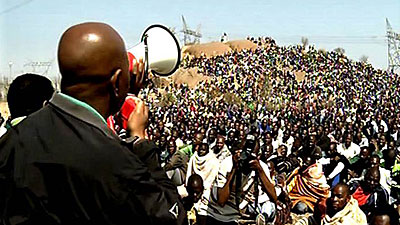South Africa has beenplagued by a number of wildcat strikes this year. Sparked by unrest in the platinum mines, the strikes quickly spilled into other industries, negatively affecting investor confidence in the country.
Rating agency Moody’s downgraded South Africa’s credit rating, citing concerns about the government’s ability to tackle economic problems. Deputy President Kgalema Motlanthe said that the downgrade was incorrect because the interpretation “demonstrates the superficial way in which world rating agencies tend to conduct their assessments.” Despite this, the strikes continued to bring heavy criticism of President Jacob Zuma’s government. Mining sector strikes On 16 August the police opened fire on striking Lonmin mineworkers in Marikana after a tense standoff that lasted several days. Thirty-four people were killed and 78 were wounded in what has been dubbed the most severe use of police force in South Africa since apartheid. Since then, the Marikana Commission of Inquiry was set up to analyse what happened in Marikana in an effort to find some measure of accountability for the event. President Jacob Zuma has announced that the commission would complete its work within four months and would have to submit its final report a month later. The Lonmin strikes had a ripple effect, causing a series of other protest action in the mining sector. Strike action followed at mines like Gold Fields’ Kloof Driefontein Complex (KDC) gold mine in Cartonville, Aquarius Platinum in Rustenburg, and Anglo American Platinum’s (Amplats) Thembelani mine in Rustenburg
Truck drivers strike
October saw over 20 000 truck drivers take to the streets demanding higher wages. The strikes became violent when trucks were torched, killing some truck drivers and hospitalizing others. Incidents of intimidation were also reported. Supplies of fuel, food and cash were also hit by the strike.
It ended when a three year wage deal with employer body, The Road Freight Employers Association was reached. Truck drivers will receive a 10% increase in the first year, 8% in the second year, and 9% in the third. SA Post Office casual workers’ strike The South African Post Office’s casual workers have been on an illegal strike for a number of months demanding permanent positions. Many of the workers concerned have been working at the Post Office for many years without getting recognition and benefits.The strike had resulted in mail carry-overs in certain areas in Gauteng.
Farm workers strike
In the beginning of November, thousands of farm workers in the Western Cape went on strike in protest of a minimum wage of R150 per day. The Labour department previously set the wage at R65 a day, but workers said it’s a slave wage. The protests were marred by violence and two deaths.
The strike has cost South Africa R150 million in lost income revenue. Damaged assets also ran into the millions. Farms will only get back to full production in five years’time, after workers torched buildings, farm equipment, vineyards and orchards. Unions have set a deadline for 9 January 2013 for the farm workers’ demands to be met.
– Compiled by Melina Meletakos; additional reporting by Morafe Tabane
Listen to Tabane’s full report on SAfm by clicking on the audio clip below.
– By


